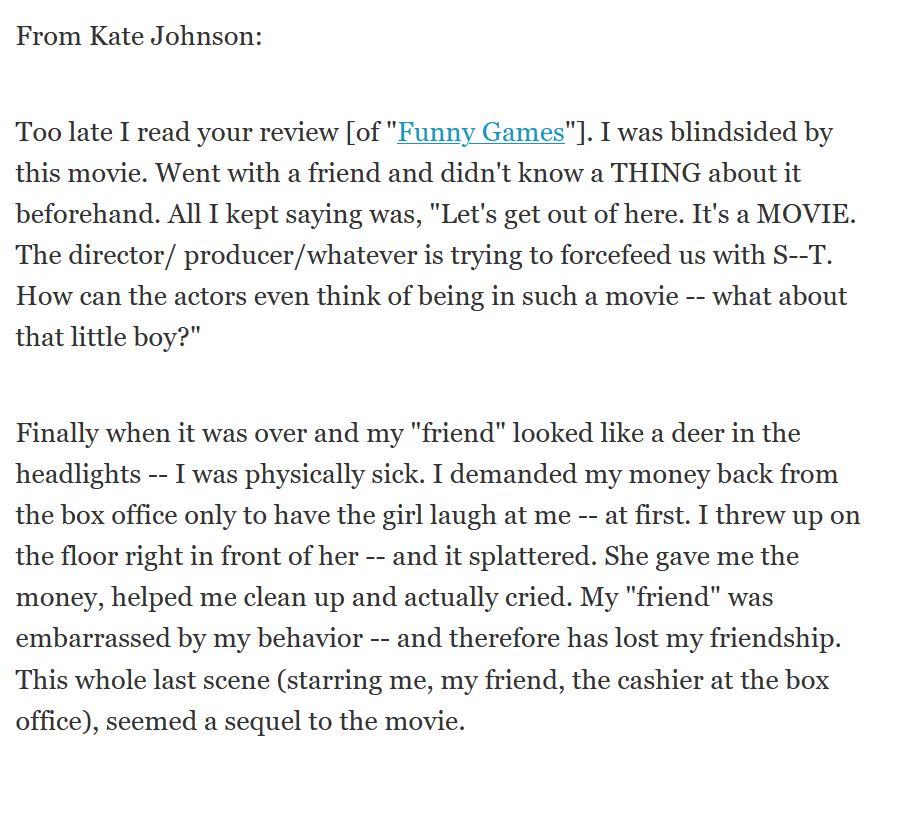Funny Games: Fun for the Whole Family
by Paul Medina, Form VI
6 min. read — November 2, 2021
Funny Games is a movie that you’ll hear about long before you watch it - and that initial impression on its own is enough to discourage most people from watching it. Of the people that do watch it, about half turn it off midway through. The remaining viewers, according to the director, have lost. The reviews for it range from slightly negative to downright hateful. Even positive reviews describe the film as “a sour project that defines anti-imaginative”. So what makes Funny Games into the movie it is? And why is it so hated?
Funny Games is ostensibly a slasher movie - but more than that, it's a sort of psychological test. Jim Emerson described it as a Skinner box and posited that the only way to truly win would be to storm the booth and rip the film out of the projector. Michael Haneke, the director, says of his film, "Anyone who leaves the cinema doesn't need the film, and anybody who stays does."
Funny Games presents itself as a slasher - and although it is slightly more brutal than the average fare, it's nowhere near violent enough to account for the savaging it receives. So why, then, is it so controversial? The answer lies in its greatest flaw - it tries to evoke an emotion that only documentaries ever consistently shoot for.

It's impossible to talk about why Funny Games exists in the way that it does without first talking about how it's not actually original - not really. Michael Haneke first made Funny Games in Austria, in German. Then, 10 years later, he remade it - shot for shot, same dialogue, in America, starring award winning actors. That alone is enough to ruffle the feathers of some reviewers - it's essentially Haneke saying to the world that he has nothing to change, and that he made his movie perfectly the first time.
Michael Haneke argues in his film-accompanying essay, (which in and of itself seems to elicit at least some sign of superiority), that technological advance and limited airtime have blurred the line between presentations of actual violence and representations of fictional violence. That blurring then normalizes and authorizes the acts of violence in the works - thereby normalizing and authorizing real life violence. It’s essentially a movie about violent media making you violent - and everybody hates it.
Haneke Manages to accomplish this by, in his own words, “making an incredibly violent, but otherwise pointless movie”. The villains motives in the film shift, purposefully pointing out the superficiality of any necessary motive. At the climax of the film, the protagonist, Naomi Watts, grabs a shotgun and shoots one of the antagonists, refusing to engage in their games. The other antagonist's response? To grab the TV’s remote and rewind the movie, rendering her choices futile - and the audience powerless.
Funny Games disempowers the viewer- it refuses to follow any framework or rules that might detract from the violence. It is a response to the modern slasher movie- you are, objectively, supposed to root against the family. They deserve their deaths as much as any horror movie characters deserve them. They guess classical sonatas by composer and time signature as a car game, they own a lake house- the father golfs. And after that, Funny Games asks you why you expected them to die- and why you wanted them to die. If Funny Games wasn’t to be as unflinchingly brutal as it is, if it played it straight, it would be an average slasher movie. It actually is a slasher movie- simply by plot alone, it's The Strangers, with a coat of paint- a movie that came out only one year after.
Funny Games lost 7 million in the box office, it’s reviewed as mostly negative, and anybody who watches it today knows exactly what the movie is about. And yet, people still watch it. Funny Games is exactly as I have described it. It is a movie where a dog, a kid, a husband and a wife are tortured, and then killed. Even knowing the twist, that it all doesn't matter, doesn't change anything - Anybody who watches the movie knows that at the end, the family will be dead. It is important to know that I’m not misrepresenting it- there is literally nothing more, and nothing less to the movie.
And yet, people still watch it. On Letterboxd, an online movie review website, 7 people have watched it in the last day alone. Jim Emerson, in his half star review, described the film as “being pitched to the "Hostel" crowd (who are invited to laugh) and the art-house crowd (who are invited to feel ennobled as they shake their heads and lament the state of violence in movies).” The Times, in their 100 Worst Films of 2008 list, described it as “art-house torture porn”.

The only people who positively review Funny Games are people who the director would view as having failed his test. There's something interesting, at the very least, about a movie that hates you for watching it. When I said that Funny Games is a psychological test, I was being truthful- but over time, that test has evolved. When Funny Games first released, it was marketed as a slasher movie- if you want violence, blood and guts, come to see Funny Games! As such, the test was to see whether you actually enjoyed violence in the media- if you truly did, and you wanted blood in the movies, you would stay, and lose the test. If you walked out, you didn't, and you would lose the test. The only way to win the test would be to rush out, demand your money back, possibly even smash the projector- and some reviewers did just that.

But now? Anybody who is going to watch Funny Games knows exactly what it's about, and what the movie is going to do. But the test still exists- only now, instead of asking whether you can reconcile the fact that you might like violence in your media, it asks:
Will you, even though the movie hates you, even though the violence is pointless, even though its point can be summed up in a single line, even though you already know everything that the movie will do, sit through it, endure it, watch a family get brutally murdered, just so that at the very end you can sit there and say that you experienced it?
Approximately 207 thousand people on Letterboxd have watched one of the two identical versions of Funny Games. 50 thousand marked one as a liked film, and 15 thousand have given one a 5 out of 5 possible stars. According to them, they would sit through it, say that they experienced it- and not only that, but on the other side, would say that they liked it.
Would you?